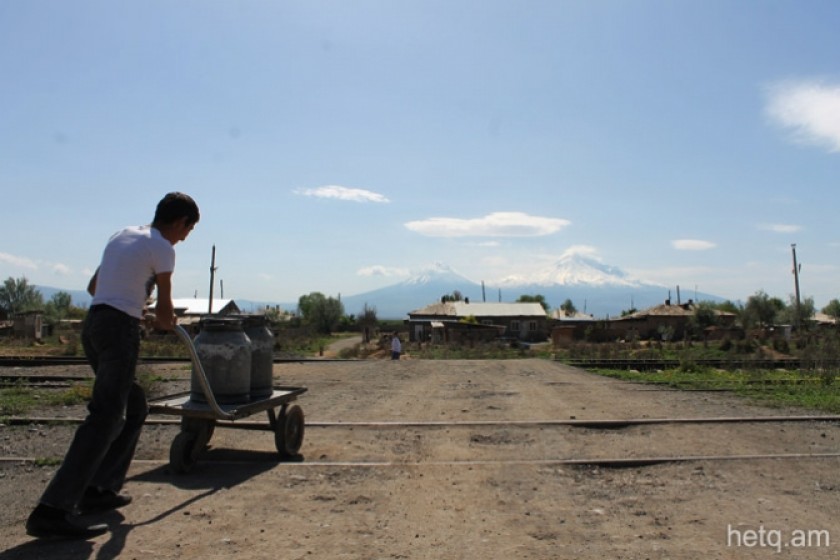
Single Mom Raises Three Kids in Yeraskh Village: ‘What’s the use of crying and complaining?’
Tateos removes a perfume jar from his pocket and squirts some on him.
“Can I help you? Are you looking for someone,” he asks. We walk along the train station, talking about life in the village and school. Tateos says he likes the village where he lives and is content.
Continuing on, we spy another boy pushing a makeshift wheel barrel on which two large canisters on water are placed. It’s Lazar, Tateos’ friend.
Tateos approaches Lazar and the two start talking. Tateos again takes out the perfume bottle, this time spraying some on Lazar. He laughs and Tateos tells him to keep his smell to himself.
Lazar ferries water for his family almost every day. He says the walk is 500 meters each way. The boy’s family is homeless. The village mayor has given them a building, which once housed train workers at the station, to live in on a temporary basis.
A bit later Lazar’s mother Anzhela Gharamanyan and her two other children, Diana and Dmitry, approach us. This family, residing in the Ararat Province village of Yeraskh some eighty kilometers south of Yerevan on the border with Nakhijevan, is registered as disadvantaged. To be fair, one would be hard pressed to a find a family here that isn’t.
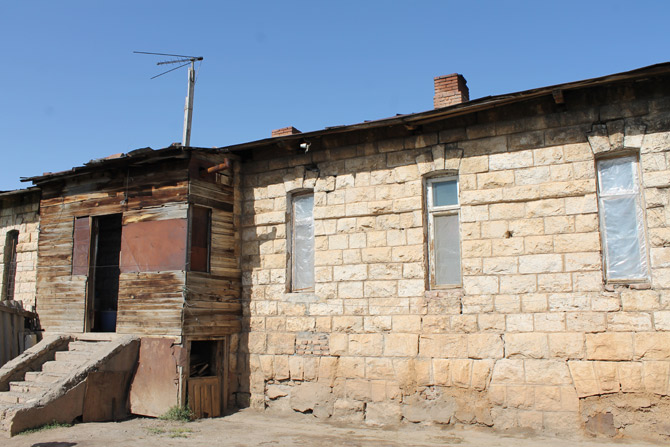
We have to cross the train tracks to get to their house. The wooden gate opens easily. The yard resembles a desert. I look around. “We can’t grow anything here. Everything dries up,” Anzhela jokes. Lazar stops pushing the barrow in the yard. A curtain conceals the outhouse a few meters away.
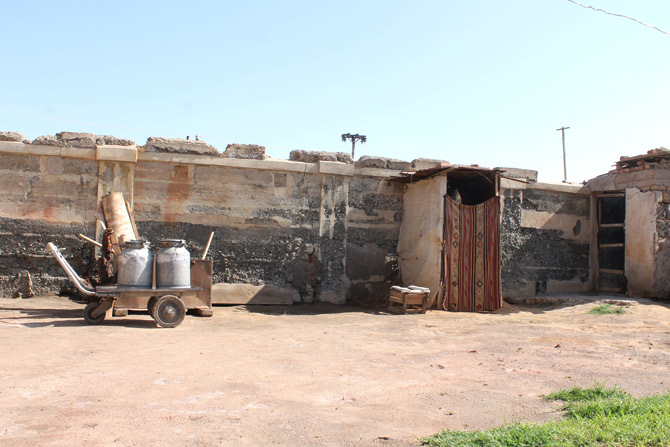
It’s pretty dark inside the house. Anzhela turns on the light. Her three kids sit down. 16 year-old Lazar, and 12 year-old Diana on the couch, and 14 year-old Dmitry on the chair. Dmitry hardly says a word during our conversation. Diana intently looks at us and then at her mom. Lazar is smiling.
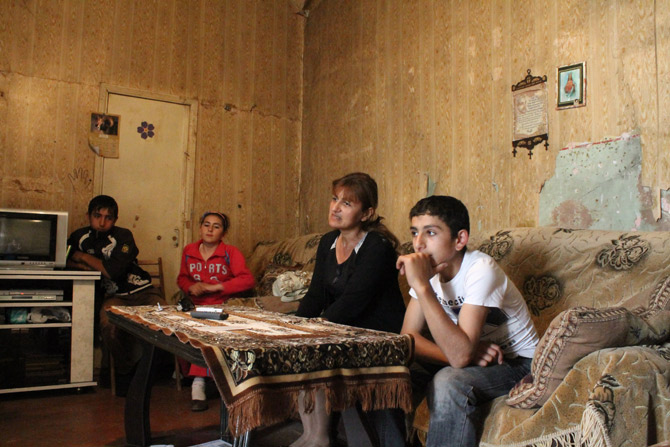
Dmitry just returned home from the fields. He’s been planting watermelon since morning. The boy’s made 2,000 AMD ($4.14) for the day. The boys usually work in their neighbor’s fields. The skip class a lot. But they have no choice. Anzhela says her husband has been in Russia for the past four years He sends back 2-3,000 rubles every month or so. The children bear the last name of their mother since their man doesn’t recognize his paternity obligations.
“We never got legally married I was his second wife. He’s eleven years older than me. He’s now fifty. My father also separated. I never thought it could happen to me as well,” Anzhela says. I try to change the topic of conversation for the children’s sake. Anzhela continues on the same topic.
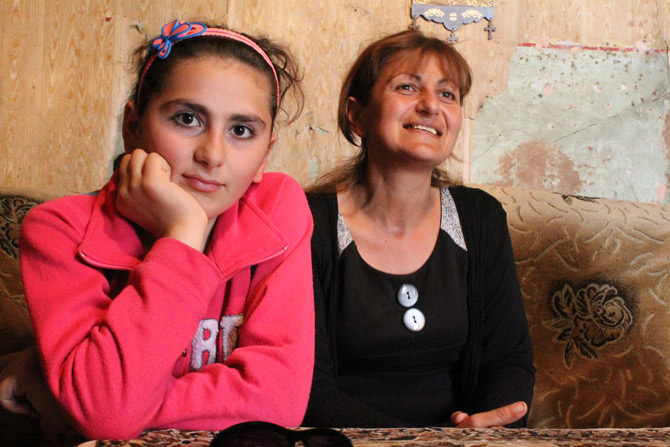
She says they lived together in the present building for twelve years. They split up and got back together on and off. The family’s stable income is a monthly social allowance of 38,000 AMD ($79). “Hey, Dmitry just brought back 2,000 drams. I’ll go buy some vegetable oil and make soup. There’s some potatoes left over as well,” she says, the smile disappearing. Six years ago Anzhela got an electric shock that injured her nerves. She experiences frequent headaches and is prone to vomit.
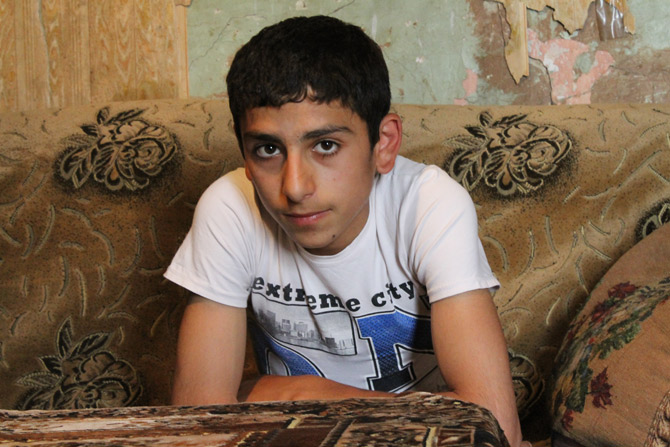
Lazar and Diana have lately begun to have vision problems. Anzhela says that Diana needs an operation but they don’t have the money. The kids no longer wear eyeglasses because the lenses are no longer clear.
I ask Lazar if it’s hard getting around without glasses. He smiles and says he gets by. Lazar says he wants to paint and have a well-lit home in Yerevan. Diana says she wants to be an actress. Dmitry remains silent. “Dimitry like cars, right?” says Anzhela looking at the boy.
“If I was in good health, I’d work,” Anzhela says. “But there are no jobs in the village. There used to be a store here where I did some cleaning and sweeping. I got some daily pocket money. No matter. It will be alright. The kids have grown up and help out. This year we’ve decided to sell watermelons on the roadside.”
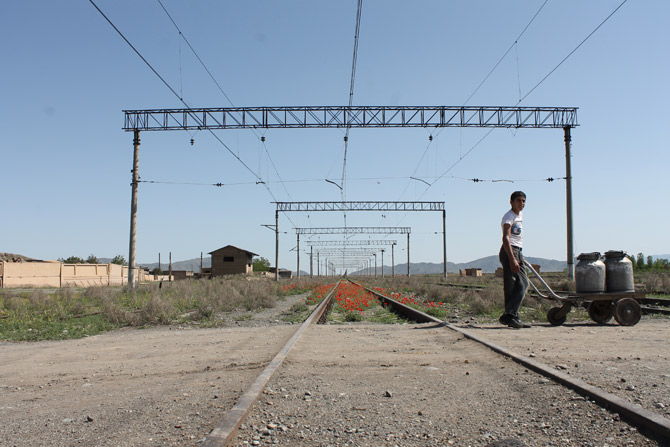
The house has no kitchen or shower. They bathe while squatting in a basin. The water has to be ferried in from a faucet at the other end of the village. The only solution would be to drill a well, but that’s too costly. “At least we have electricity. When we moved here we didn’t even have lights,” says Anzhela.
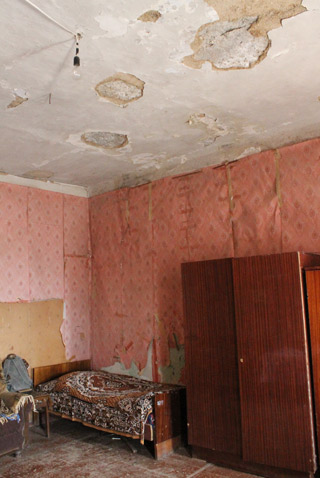
The walls in the adjoining room are cracked. So is the ceiling. But Anzhela doesn’t complain. I ask her what gives her strength.
“What should I do, complain and cry? We’ve gotten used to things. My hope is in God. People help us with clothes and stuff. We’re all wearing second hand items,” she says. Anzhela’s parents live in Yeraskh too. They help out whenever possible. Anzhela and her parents relocated to Yeraskh from Baku in 1988.
As we say our goodbyes, Anzhela tells me that their neighbors are in worse shape and that they are in greater need of assistance.
Dmitry shows us the way to the neighbors. I try to get him to talk and to find out why he’s so taciturn. The boy says he cuts classes frequently and that his teachers know he works in the fields. He claims they aren’t cross at him for doing so.
Dmitry open up and starts talking about working in the fields; how he crouches all day and gets tuckered out. He says that the landowners try to pay him less after they find out he’s a minor. Given that the village lies on the border with Nakhijevan, I ask Dmitry if there is shooting. He says there’s shooting every day.
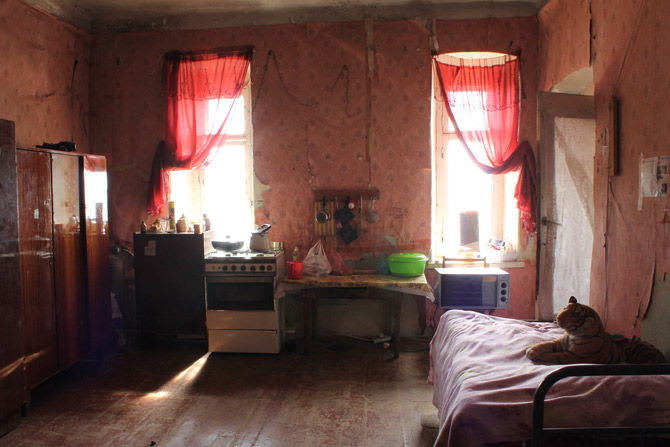
When we get to the neighbors’ house the mother tells us that Anzhela’s family is worse off than hers is. “They have no home or livelihood. At least I have a husband who works now and then,” she tells me.
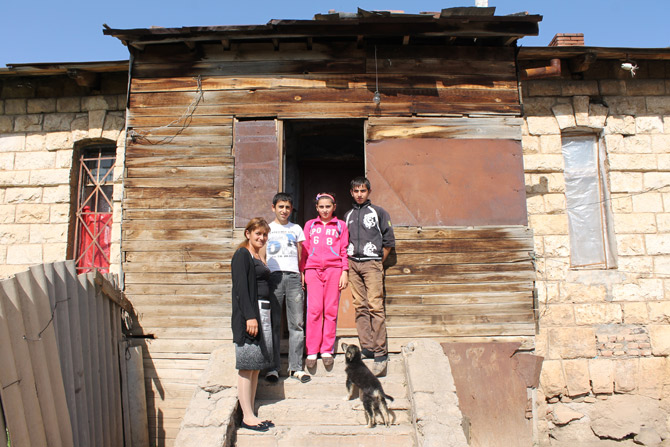
Waiting at the village bus stop I remember the words of the village mayor – whoever assists Anzhela’s family will be blessed a thousand fold.
 Videos
Videos Photos
Photos




Write a comment